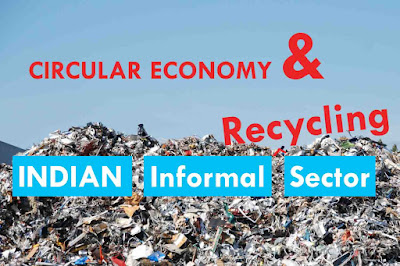Despite the fact that Indian Informal recycling sector is adopting less stringent procedures and people are exposed to hazardous materials, it is proving the world as the greatest contributor to the circular economy.
into the economy for second and third cycles conserves both material value and
natural capital. Reference: link
The most fascinating thing here is only 6.5% of the plastic waste generated in the USA is recycled whereas, in India, almost 40% of the plastic is getting recycled luckily due to informal handling and recycling of plastic. Even though formal recycling is gaining pace recently, most of the recycling is happening in the Informal sector.
In many ways, the Indian informal recycling sector is a part of these goals. By employing thousands of workers who are working just to earn their living, The informal sector is contributing to SDG-1 and SDG-2. It also contributes towards achieving SDG 12 (Responsible Consumption and Production), SDG 8 (Decent Work and Economic Growth), 9 (Industry, Innovation and Infrastructure), 11 (Sustainable Cities and Communities), and 13 (Climate Action).Link
Here is the list of SDGs if you are interested to have a look at:
2) End hunger, achieve food security and improved nutrition and promote sustainable agriculture
3) Ensure healthy lives and promote well-being for all of all ages
4) Ensure inclusive and equitable quality education and promote lifelong learning opportunities for all
5) Achieve gender equality and empower all women and girls
6) Ensure availability and sustainable management of water and sanitation for all
7) Ensure access to affordable, reliable, sustainable and modern energy for all
8) Promote sustained, inclusive and sustainable economic growth, full and productive employment, and decent work for all
9) Build resilient infrastructure, promote inclusive and sustainable industrialisation, and foster innovation
10) Reduce inequality within and among countries
11) Make cities and human settlements inclusive, safe, resilient and sustainable
12) Ensure sustainable consumption and production patterns
13) Take urgent action to combat climate change and its impacts (taking note of agreements made by the UNFCCC forum)
14) Conserve and sustainably use the oceans, seas and marine resources for sustainable development
15) Protect, restore and promote sustainable use of terrestrial ecosystems, sustainably manage forests, combat desertification and halt and reverse land degradation, and halt biodiversity loss
16) Promote peaceful and inclusive societies for sustainable development, provide access to justice for all and build effective, accountable and inclusive institutions at all levels
17) Strengthen the means of implementation and revitalise the global partnership for sustainable development
References: WBCSD, The Guardian, Plastics Insights
A Brief note on Circular Economy
Circular Economy is making use of materials to the maximum level by reducing the production of virgin materials. It involves recycling and reusing. Circular Economy plays a key role in sustainability and Climate change aspects. Reintroducing secondary materialsinto the economy for second and third cycles conserves both material value and
natural capital. Reference: link
 |
| CS |
Plastic Recycling
Plastic is the most versatile material of 21st century. It is extensively used in various applications. On an average, a person on this planet is consuming 45 kg of plastic per year. The highest consumption is in North America with 139 kg/person and the lowest of 16 kg/person is witnessed in the Middle East and African countries (2015 data). An average Indian consumes 13 kg/year of plastic which is very low when compared to western countries.The most fascinating thing here is only 6.5% of the plastic waste generated in the USA is recycled whereas, in India, almost 40% of the plastic is getting recycled luckily due to informal handling and recycling of plastic. Even though formal recycling is gaining pace recently, most of the recycling is happening in the Informal sector.
 |
| Source: Plasticinsights |
Informal Plastic Recycling Sector and the United Nations Sustainable Development Goals
The Sustainable Development Goals which are popularly called SDGs were implemented in 2015 in UN General Assembly with a vision of attaining certain goals in the next 15 years.In many ways, the Indian informal recycling sector is a part of these goals. By employing thousands of workers who are working just to earn their living, The informal sector is contributing to SDG-1 and SDG-2. It also contributes towards achieving SDG 12 (Responsible Consumption and Production), SDG 8 (Decent Work and Economic Growth), 9 (Industry, Innovation and Infrastructure), 11 (Sustainable Cities and Communities), and 13 (Climate Action).Link
Here is the list of SDGs if you are interested to have a look at:
The list of SDGs:
1) End poverty in all its forms everywhere2) End hunger, achieve food security and improved nutrition and promote sustainable agriculture
3) Ensure healthy lives and promote well-being for all of all ages
4) Ensure inclusive and equitable quality education and promote lifelong learning opportunities for all
5) Achieve gender equality and empower all women and girls
6) Ensure availability and sustainable management of water and sanitation for all
7) Ensure access to affordable, reliable, sustainable and modern energy for all
8) Promote sustained, inclusive and sustainable economic growth, full and productive employment, and decent work for all
9) Build resilient infrastructure, promote inclusive and sustainable industrialisation, and foster innovation
10) Reduce inequality within and among countries
11) Make cities and human settlements inclusive, safe, resilient and sustainable
12) Ensure sustainable consumption and production patterns
13) Take urgent action to combat climate change and its impacts (taking note of agreements made by the UNFCCC forum)
14) Conserve and sustainably use the oceans, seas and marine resources for sustainable development
15) Protect, restore and promote sustainable use of terrestrial ecosystems, sustainably manage forests, combat desertification and halt and reverse land degradation, and halt biodiversity loss
16) Promote peaceful and inclusive societies for sustainable development, provide access to justice for all and build effective, accountable and inclusive institutions at all levels
17) Strengthen the means of implementation and revitalise the global partnership for sustainable development
References: WBCSD, The Guardian, Plastics Insights
